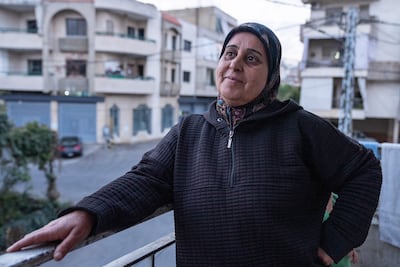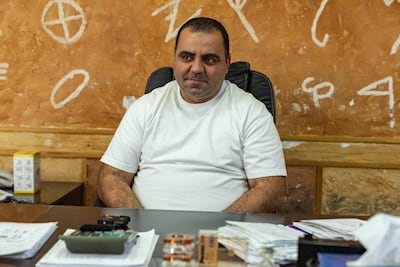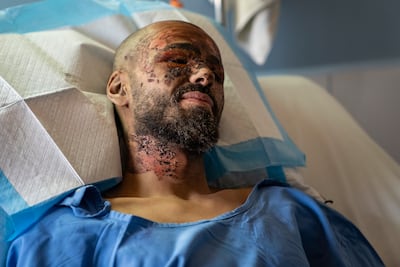Live updates: Follow the latest on Israel-Gaza
Until a week ago, Zaynab Sharaf had maintained some semblance of a normal life in the Lebanese village of Hawsh Al Rafiqa, in the north-eastern Baalbek region. Israel since issued several eviction orders in the area, before attacking what it says are sites linked to Hezbollah.
Her village was no stranger to the conflict, which escalated when Israel expanded cross-border strikes into a sweeping aerial campaign. Hawsh Al Rafiqa bears the scars of war at the site where two girls, aged five and eight, were killed at the start of the fighting, when Israel bombed their neighbour's house. It now lies in ruins.
But in the Bekaa Valley, a fertile plain in eastern Lebanon where the village sits, violence appeared to stabilise. Residents said they were becoming accustomed to it, drawing strength from the proverbial Lebanese resilience, forced on them by years of conflict and crises.
When The National met Ms Sharaf, she was hosting guests, serving plates of pasta, aubergines, chips and glasses of fizzy drinks. From the outside, it looked like a typical Lebanese family lunch, with laughter exchanged over a delicious meal as Ms Sharaf urged her guests to keep eating until they couldn’t. While others had left the village amid the violence, she wanted to stay in her house with her husband and children for as long as possible.
Little did she know that everything would soon change. On the deserted road back to Beirut, minutes after leaving Ms Sharaf’s house, The National's correspondents noticed black smoke rising from nearby villages.
They were the first in a series of attacks that have struck the Bekaa Valley since last Monday. That day, the death toll continued to rise late into the night, reaching 67, Baalbek-Hermel Governor Bashir Khodor said.

Two days later, Ms Sharaf left her home in a hurry, after receiving calls from the Israeli army ordering residents to leave the area. She said it was the first time she felt fear since the war started. That day, the Israeli army issued its first bombing notice for Baalbek and the surrounding area. The escalation forced tens of thousands to hastily flee.
Throughout the week, Baalbek and its district, home to 3,000-year-old Roman temples that are part of an Unesco World Heritage Site, was dragged deeper into war and chaos. Israel's intensified attacks on the Bekaa Valley have killed more than 160 in a week, The National found using official figures.
Israel says it is attacking sites linked to Hezbollah, the Lebanese group that holds sway over parts of the Bekaa Valley. The recent attacks in the area, which borders Syria, suggest an attempt to disrupt the group's supply route for weapons. But doctors, officials, and residents told The National that they have been bearing the brunt of Israeli attacks.

‘Everyone’s gone'
About 40 per cent of the population was still in Baalbek when The National first spoke with Mayor Moustafa Al Chal last Monday, in front of the Roman ruins. But a week later “everything has changed", he said. “Everyone’s gone. The city’s soul has left.”
The destruction has worsened, he added. While the ancient temples remain unharmed, the Gouraud Barracks, dating back to the French mandate and built around the city’s historic gate near the Acropolis, have been damaged.
On Friday, the UN Human Rights Office said Israeli air strikes had “come perilously close” to the Roman-era temple complex. “The city will remain under threat as long as there’s war,” Mr Al Chal said.
The attacks do not only put the city’s rich heritage at risk – they also pose a threat to its people. Amir Nemer, 21, was injured in last Monday's strike on the Gouraud barracks.
Lying in bed at Dar Al Amal University Hospital, injuries to his face meaning he struggles to keep his eyes open, he recounted the horror of the attack that killed his brother and father. The strike destroyed his relative's house where he was staying and left him with severe burns. He said he runs a shop that sells supplies for babies.

“We were staying in our house. The women had already left for safety reasons, but you know you can't just abandon your home. And even if we leave our land, who will remain?” he said.
They had not received any warnings before Israel launched the strike, he said. Six people died in the attack, the Lebanese National News Agency reported.
Ali Allam, director of Dar Al Amal University Hospital, said that, before last week's escalation, staff had resumed treating chronic illnesses. “This was good for morale. It meant we weren’t just dealing with war-related injuries, but were functioning as a regular medical centre again," he explained.
He said the hospital had been fully functioning, with about 90 per cent of the staff still reporting for work before Israel’s onslaught last week. Now, the staff is back to treating patients with war injuries including Mr Nemer, as missiles land with in hundreds of metre of the hospital. Half of the staff have since fled the violence.
Evictions maps
Israel's first bombing notice for Baalbek and the surrounding area came late – two days after the country began escalating its attacks. The maps, published regularly by the Israeli army and criticised by rights groups for sparking mass displacement, also appear to be inaccurate.
Many villages around Baalbek where Israel has launched deadly attacks are not included in the maps. These include the village of Bednayel, where a strike on a residential building killed eight people last Wednesday. When The National visited Bednayel on Thursday, as part of a rare Hezbollah media tour of the Bekaa Valley, rescue workers were still searching through the rubble, where nappies, children’s socks and pyjamas were scattered.
The victims were all from the same family. "Is that what Israel is targeting?" a man asked, as he picked up a pair of tiny pink shoes from the rubble.
Ali said his brother, sister-in-law and their two children were killed in the strike. He stressed that all of the victims were civilians – his brother was a home designer and his sister-in-law owned a beauty salon, he added.
He said he found his niece’s arm in some bushes several metres from the site of the blast. But he remains defiant, despite the threat of Israeli attacks. "We won't leave our land and won't surrender," he said.
